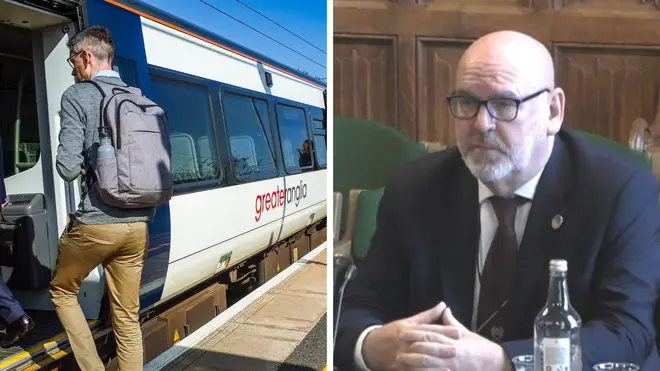
James O'Brien 10am - 1pm
14 July 2022, 13:12 | Updated: 14 July 2022, 21:57

RMT members at Network Rail and 14 train operators will strike for two further days on August 18 and 20 in the row over jobs, pay and working conditions, the union announced.
It comes after strikes were announced by various unions on July 16, 23, 27 and 30.
Train drivers at eight rail companies will strike on July 30 in a dispute over pay, their union Aslef announced earlier.
Members of Aslef at Arriva Rail London, Chiltern Railways, Greater Anglia, Great Western, Hull Trains, LNER, Southeastern and West Midlands Trains will walk out.
Drivers on Greater Anglia will also strike on July 23, and those on Hull Trains will strike on July 16 and 23.
The action is in addition to a planned strike by the Rail, Maritime and Transport union (RMT) at train companies and Network Rail on July 27 and by TSSA members on Avanti West Cost on the same day.
Read more: 'Public support us': Militant RMT boss Mick Lynch claims ahead of fresh train strikes
Read more: More travel chaos expected as train drivers vote to strike over pay dispute

Rail strikes set to be biggest since rail was privatised
Aslef general secretary Mick Whelan said: "We don't want to go on strike - strikes are the result of a failure of negotiation - and this union, since I was elected general secretary in 2011, has only ever been on strike, until this year, for a handful of days.
"We don't want to inconvenience passengers, not least because our friends and families use public transport too, and we believe in building trust in the railways in Britain, and we don't want to lose money by going on strike.
"But we've been forced into this position by the train companies, driven by the Tory Government.
"The drivers at the companies where we are striking have had a real-terms pay cut over the last three years, since April 2019.
"These companies are offering us nothing, saying their hands have been tied by the Government.
"That means, in real terms, with inflation running ahead at 9%, 10%, and even 11% this year, according to which index you use, that they are being told to take a real-terms pay cut, and that is not acceptable.
"Strike action is, now, the only option available but we are always open to talks if the train companies, or the Government, want to talk to us and make a fair and sensible offer."